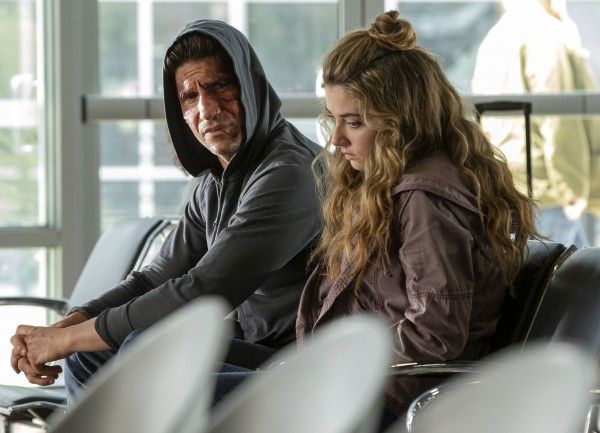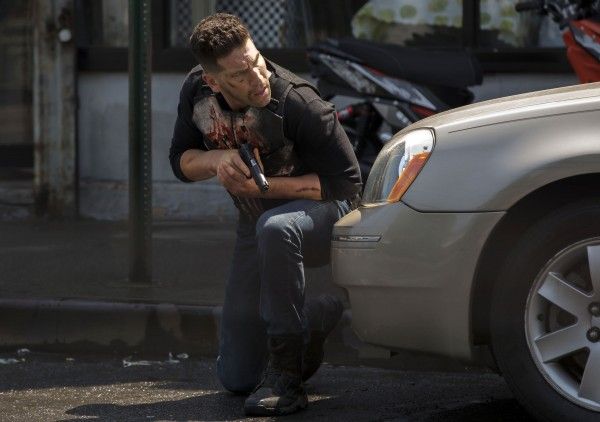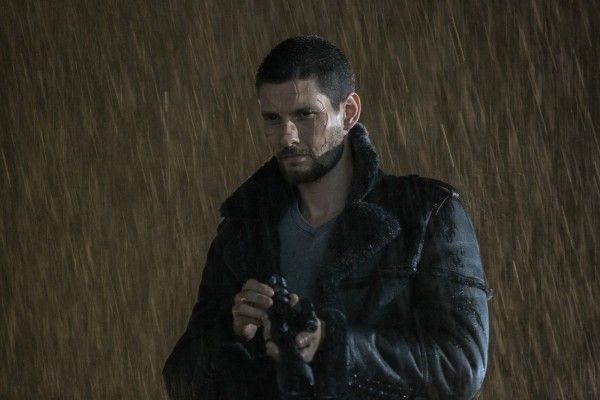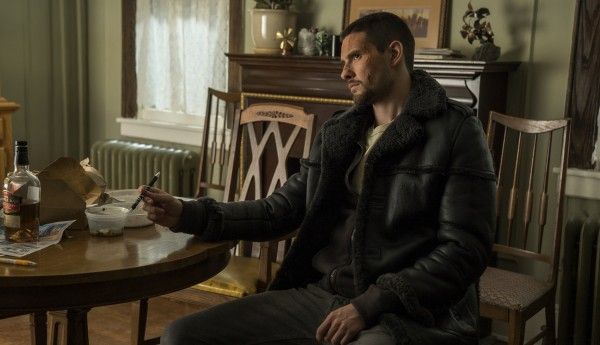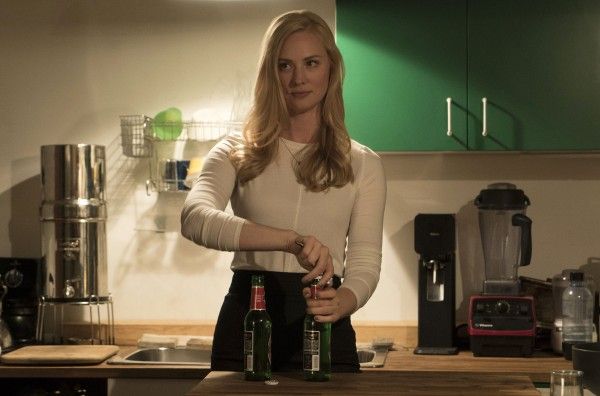After the events of Season 1, former Marine turned vigilante Frank Castle (Jon Bernthal), also known as The Punisher, has been keeping to himself and living a quiet life on the road. When he finds himself a witness to the attempted murder of a teenaged girl (Giorgia Whigham), stepping in sends him down a path that puts a target directly on him, forcing him to uncover the dangerous mystery that she’s caught up in while also facing an old enemy, in Billy Russo (Ben Barnes), that could destroy him.
During this phone interview to promote Season 2 of the Netflix series The Punisher, Collider got the opportunity to chat 1-on-1 with showrunner Steve Lightfoot about how Season 2 evolved, what they wanted to do more and less of, how taking Frank Castle on the road and outside of New York City changed things up, taking inspiration from The Professional, keeping Billy Russo as real as possible, the importance of Karen Page (Deborah Ann Woll), his hopes for the future of the TV series, whether he already has a plan for Season 3, and what it means to him to be a part of the legacy of Stan Lee. Be aware that there are major spoilers discussed.
Collider: Looking back on the first season, when do you feel that the show was at its best and how do you feel Season 2 built on that?
STEVE LIGHTFOOT: I feel like the show is at its best when the power of the work is deep and truthful. Obviously, these shows are comic book adaptations, and the action is heightened, and the stories we tell are action thriller stories, but the idea, from when I first spoke to Marvel and Netflix – and I think all of the shows did this – was for the character work to be grounded and real. I certainly feel like, for me, the show works best when the emotional stuff feels real, in and amongst all of the genre, and that was something that we were keen to carry on. For me, Season 1 was very much a revenge story, but it was also about watching a man deal with grief, and admit his own culpability in his family’s death. And so, Season 2 was about finding a new emotional journey for Frank because we didn’t want to tell a story where he was just grieving his wife again, and maybe there was some guy who had something to do with it, that we didn’t know about before. It was about finding a new journey for him. Season 1 was about very specifically coming to terms with what had happened to his family. And then, from there, I always liked the idea that Season 2 had a story that was much more about him realizing his nature is what it is, and that he was always meant to be The Punisher, and he was going to adopt that mentality, even when the story wasn’t purely personal.
Was there anything that you were able to do in Season 2, that you couldn’t have done in Season 1?
LIGHTFOOT: I don’t think so. We had a great time with Season 1. Marvel and Netflix were incredibly supportive of everything we were doing. What we wanted to do was the show that we made. I don’t think there was anything that we felt we lost out on. There were things, going into Season 2, that I was keen to do more or less of. You always want to better yourself, in terms of the action and the choreography and the set pieces, so having set a bar for ourselves, in Season 1, we certainly wanted to top that. It’s always going to be a relatively dark show, but I was also keen that there was some more humor and a little more of that action genre fun, in this season. It wasn’t about two men, grieving their wives. It was a bigger story for Frank, and I thought we could just make the show a little more fun than Season 1 was.
What made you decide to kick off the season by taking Frank Castle on the road and outside of New York City, and what do you think that allowed you to do with the storytelling that you couldn’t have done otherwise?
LIGHTFOOT: Obviously, we make the show in New York, and Billy Russo was there, so we were always going back. But one of the good things about Frank, as a character, is that he’s not tied to New York, in the way Daredevil is or Jessica Jones is, which are quintessentially New York stories. Frank can turn up anywhere. At the end of Season 1, with that final scene, I felt like Frank wouldn’t want to stay in New York, and I was just taken with the idea that he probably went off to see the America that he’d never really seen, even though he spent years defending it and his country. So, I loved this idea that he had just been driving around the country, not staying anywhere too long because he didn’t want to put down roots because, deep down, he knows that, bad stuff will happen around him. What came out of that was that I knew, pretty early on, I wanted to put him in a relationship with a young girl and play this surrogate daughter relationship, just because it would allow you to see a completely different side of him. There was great potential for chemistry there. I was a huge fan of The Professional, the Luc Besson movie, and I loved the idea of doing something like that with Frank. I feel like those first three episodes became a Western, and I’m a huge fan of that genre. Frank has so many parallels with the Western hero of classic American film. And so, I loved the idea that the first three episodes were, in essence, a Western. Episode 1 essentially takes place in a saloon. The siege in Episode 3 played like Rio Bravo. So, we could just have fun with this different side of America and play with the genre, before we took it back to New York and picked up the Billy Russo story.
Season 1 was an origin story for Billy Russo’s character, and then Season 2 really strips all of that away and we see what he’s like now, with the scrambled brain that he’s dealing with. What made you decide to really focus on that and explore what that would be like?
LIGHTFOOT: It was about just doing justice to a character and starting from, if that were done to you and you were given those injuries, what state would you be in? We did a lot of research into the effects of traumatic brain injury. Regardless of the cosmetic damage to his face, what would those injuries have done to his brain? The effects of TBI are very varied. A lot of the time, they change people, emotionally, as well as messing with memory. It was the idea that we could show a real version of that, rather than just something token. I loved this idea that, if Billy didn’t remember what had been done to him, he could feel like he was the victim, this season. It was fun to flip that switch. He was a guy that felt that he was the one whose brother had betrayed him. He was almost in the shoes Frank wore, in Season 1. I thought that was just a really interesting dynamic to give them, and it felt much more truthful than him waking up and just deciding that he wanted to rule the world, or being a mustache-twirling villain. It felt like a real way that character would go.
It is risky though to stick a mask on your villain and fully cover his face, so did you ever have any moments where you wondered why you did that, or did that just work, right away?
LIGHTFOOT: It really worked. The mask stuff was born out of some research that we did into TBI therapy, where this is a therapy that’s been used to help people come to terms with facial injuries, and what have you. There was a little bit of wait and see for the audience and the fans. I hoped that they would like that we didn’t let them see him, straight away. We teased what was behind the mask, both physically and mentally.
(SPOILERS)
Was there much thought and conversation about how to handle the fate of Billy Russo, at the end of this season? Is this the ending that you always wanted, for his story?
LIGHTFOOT: It developed. It wasn’t something we went into saying, “He’s gonna die.” We didn’t know that was what was gonna happen. But as we broke the story in the writers’ room, the thing I kept coming back to, because so much of the story is driven by Frank having to deal with the fact that he didn’t kill him the first time and now all this stuff is happening because of that, was that I just couldn’t find any version of the world, in my head, where Frank would let him get away again, and wouldn’t finish the job that he didn’t finish the first time. If just kept feeling untruthful, to end it a different way. But then, when we got into that, they’d already had big showdowns. We had big fights with him in Season 1, and then in Episode 7, 8 and 10, of this season, so it just started to feel real and that it was this much more lyrical, cold, tragic end to a friendship. But it very much developed, as we went along.
(SPOILERS END)
Karen Page is a very important character in the world of Frank Castle. What do you feel that she brought to Season 2 and Frank’s journey?
LIGHTFOOT: I watched Daredevil Season 2, as a fan, like anyone else, before I came to work on this show, and I just thought that relationship was so great, and we built on it, in Season 1 of The Punisher. I would love to have as much Deb [Ann Woll] and Karen as I could in the show, but they were shooting Daredevil, at the same time that we were shooting The Punisher, so it was always going to be incredibly hard to work out how we could have more of Karen in there, but everyone was excited to have her in there for one episode. What she’s always done so well, as a character, because Frank trusts her and respects her, is that she can hold a mirror up to him, in a way that most people can’t, and make him look in it. So, we saved our shot at having Karen in the show until the very pivotal moment when Frank really needed her because she’s probably the only person who knows him well enough to have those scenes with him in that hospital. What I love about that relationship is that, across the three seasons of shows that it’s appeared in now, we’ve never defined it. Some people see romance there, and some people see a brother and sister dynamic between them. I love that we still have the possibility to go wherever we like with that, in the future.
Obviously, with the cancellations of Iron Fist, Luke Cage and Daredevil, fans of the series are starting to get a bit nervous about the fates of Jessica Jones and The Punisher. If this is the end of the story and the last time that we’ll see these actors in these roles, is that something that you think will be hard for you to say goodbye to?
LIGHTFOOT: Some of the other shows have gone, but I’m still hoping that we get Season 3. I’m taking the position where, when I made Season 1, it went out and we didn’t know whether we would get a Season 2, but the show obviously did well enough that we got that Season 2 pick-up. So, I’m living optimistically, that we’ll get to go again. We finished the show before any of those cancellations happened. People have said to me, “How do you feel about where the show ends?,” but I ended the show in a place that I hope just makes people feel like, “I can’t wait for Season 3. I still hope that’s the case.
Do you have a plan in mind for Season 3, if that is the case?
LIGHTFOOT: I do, yeah. If they give us the go ahead, we’re ready to jump in, pretty much straight away. I’ve got a pretty good idea about what Season 3 is, and I’m very excited about it.
I love that this season is dedicated to Stan Lee. Now that he’s no longer with us, what does it mean to you to be even just one small part of his legacy?
LIGHTFOOT: It’s amazing! I’m sad to say that I never got to meet him, personally. I’m English and I grew up in the UK, but I came to America ‘cause I’m a huge America-phile, and when I was 8 through when I was 13, I used to rush home on the day that my copy of Spider-Man arrived. That’s where my initial love of America came from, partly because it was just super cool, but also because here was an ethos in those comic books that, as a Brit, felt uniquely American, where the good guys win, and there was an optimism and hope amidst all the excitement, and a humor that was formative for me. And then, I got into my late teens and 20s, and I had moved away from comic books, but I loved all of the movies. So, when I got a call saying, “Hey, do you want to go meet at Marvel?,” It felt like things were going full circle. It’s been an amazing thing, to be a part of that legacy. It’s only when you really dig into it, and you realize just how many characters and things he was responsible for, that you see that it’s a pretty amazing legacy. I didn’t meet him, but from the outside, it certainly seemed as though he just never lost his love of a great story, which is fantastic. It never felt to me like anything ever got cynical, which is a testament to character writing.
The Punisher Season 2 is available to stream at Netflix.


